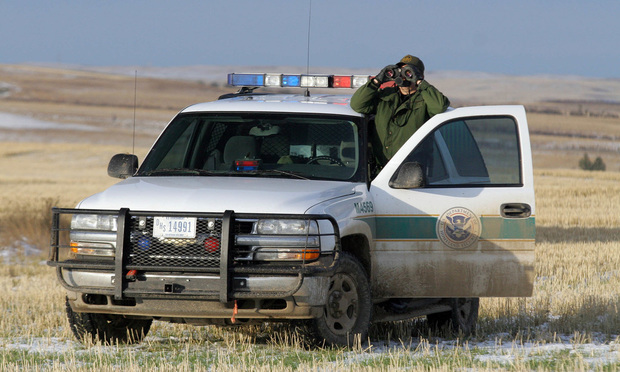South Texas Lawyer-Rancher Duels With Government Over Surveillance Camera on His Property
Ricardo Palacios, who has been a member of the Texas bar for nearly five decades and worked with clients in the gas and oil business, said he was driving around his 1,000-acre ranch in November when he noticed a camera strapped to a mesquite tree.
February 28, 2018 at 05:13 PM
4 minute read

A South Texas cattle rancher and semi-retired lawyer is taking on federal and state immigration law enforcement officials, claiming they illegally trespassed onto his property and secretly installed a surveillance camera as part of their efforts to snag illegal border-crossers.
Ricardo Palacios, who has been a member of the Texas bar for nearly five decades and worked with clients in the gas and oil business, now devotes his efforts to running his ranch in Encinal, in La Salle County.
Palacios said he was driving around his 1,000-acre ranch in November when he noticed a camera strapped to a mesquite tree.
“I said what the hell, what's that doing there,” Palacios said. “I took out a machete and took it down.”
It turned out that the camera was placed there by the Texas Rangers, an arm of the Texas Department of Public Safety, and the U.S. Customs and Boarder Protection as part of “Operation Drawbridge,” which monitors the border between Texas and Mexico.
Palacios, who said he's had had past run-ins with law enforcement entering his property without his permission, said he never authorized border patrol officials to install any surveillance cameras. So, after taking it down, he kept it.
Palacios, a 1970 graduate of St. Mary's School of Law in San Antonio, said he then began getting calls from the Rangers and CBP—presumably because the camera stopped broadcasting—demanding the return of the camera, an off-the-shelf item that retails for about $300.
“I said, 'No. I'm not going to give it to you,'” he said
On its website, the state DPS says it uses the cameras to monitor the border with CBP because there are not enough funds to pay for sufficient personnel to personally watch the 1,200-mile border.
Despite facing possible charges of theft of government property, Palacios refused to return the camera, saying he was going to keep it since he was filing a lawsuit demanding that law enforcement obtain his authority before entering his property. Despite threats of arrest, he has refused to return the camera, he said.
Under federal law, border patrol agents have the right to enter onto private property without permission within 25 miles of any border, excluding private residences. However, Palacios' cattle ranch is 35 miles north of the border.
“They need to get my permission before they go on my property,” said Palacios, who inherited the ranch in 1995.
He then filed his federal lawsuit against the border patrol and the Rangers. He said the camera, now in the possession of his attorneys, should not be returned until he is paid $500,000 in compensatory damages and is given a promise that border patrol officials will not encroach on his property without first seeking his permission.
Palacios is represented by Laredo solos David Almaraz and Raul Casso. The matter currently is before U.S. Magistrate Judge Guillermo Garcia of the Southern District of Texas, sitting in Laredo. No hearings have been scheduled.
“Defendants installed the camera on plaintiff's property under no circumstances, exigent or otherwise, that would allow defendants to intrude on plaintiff's property,” Amaraz and Casso wrote in a court filing.
They are asking Garcia to keep the surveillance camera in his possession pending the outcome of Palacios' lawsuit.
“He's not going to give the camera back at this point,” Casso said. “If the ranch was within 25 miles of the border, we wouldn't have a case. But the ranch is at the 35-mile marker on Interstate 35.”
“We have yet to hear from the government,” Almaraz added.
A spokesman for CBP said the agency would not comment on pending litigation. Officials from the Texas Department of Public Safety also declined to comment.
Palacios said he has not discovered any other cameras on his property.
“There may be other cameras or sensors there. I don't know,” he said.
This content has been archived. It is available through our partners, LexisNexis® and Bloomberg Law.
To view this content, please continue to their sites.
Not a Lexis Subscriber?
Subscribe Now
Not a Bloomberg Law Subscriber?
Subscribe Now
NOT FOR REPRINT
© 2025 ALM Global, LLC, All Rights Reserved. Request academic re-use from www.copyright.com. All other uses, submit a request to [email protected]. For more information visit Asset & Logo Licensing.
You Might Like
View All
Read the Document: DOJ Releases Ex-Special Counsel's Report Explaining Trump Prosecutions
3 minute read
Houston Trial Lawyer Mary-Olga Lovett Leaves King & Spalding to Open Boutique
3 minute read
The Gospel According to Paxton? AG Fights Religious Group Over Migrants
6 minute read
Trending Stories
- 1SEC Files Lawsuit Against Elon Musk Over Untimely Twitter Ownership Disclosure
- 2Survey Finds Majority of Legal Professionals Still Intimidated by AI Despite Need to Streamline Mounting Caseloads
- 3FTC Launches Inquiry of Single-Family Rental Home 'Mega Investors,' Issues PBM Report
- 4Womble Bond Dickinson's Wilmington Office Sees New Leadership as Merger Is Completed
- 5Defending Against a $290M Claim and Scoring a $116M Win in Del. Drug Patent Fight
Who Got The Work
J. Brugh Lower of Gibbons has entered an appearance for industrial equipment supplier Devco Corporation in a pending trademark infringement lawsuit. The suit, accusing the defendant of selling knock-off Graco products, was filed Dec. 18 in New Jersey District Court by Rivkin Radler on behalf of Graco Inc. and Graco Minnesota. The case, assigned to U.S. District Judge Zahid N. Quraishi, is 3:24-cv-11294, Graco Inc. et al v. Devco Corporation.
Who Got The Work
Rebecca Maller-Stein and Kent A. Yalowitz of Arnold & Porter Kaye Scholer have entered their appearances for Hanaco Venture Capital and its executives, Lior Prosor and David Frankel, in a pending securities lawsuit. The action, filed on Dec. 24 in New York Southern District Court by Zell, Aron & Co. on behalf of Goldeneye Advisors, accuses the defendants of negligently and fraudulently managing the plaintiff's $1 million investment. The case, assigned to U.S. District Judge Vernon S. Broderick, is 1:24-cv-09918, Goldeneye Advisors, LLC v. Hanaco Venture Capital, Ltd. et al.
Who Got The Work
Attorneys from A&O Shearman has stepped in as defense counsel for Toronto-Dominion Bank and other defendants in a pending securities class action. The suit, filed Dec. 11 in New York Southern District Court by Bleichmar Fonti & Auld, accuses the defendants of concealing the bank's 'pervasive' deficiencies in regards to its compliance with the Bank Secrecy Act and the quality of its anti-money laundering controls. The case, assigned to U.S. District Judge Arun Subramanian, is 1:24-cv-09445, Gonzalez v. The Toronto-Dominion Bank et al.
Who Got The Work
Crown Castle International, a Pennsylvania company providing shared communications infrastructure, has turned to Luke D. Wolf of Gordon Rees Scully Mansukhani to fend off a pending breach-of-contract lawsuit. The court action, filed Nov. 25 in Michigan Eastern District Court by Hooper Hathaway PC on behalf of The Town Residences LLC, accuses Crown Castle of failing to transfer approximately $30,000 in utility payments from T-Mobile in breach of a roof-top lease and assignment agreement. The case, assigned to U.S. District Judge Susan K. Declercq, is 2:24-cv-13131, The Town Residences LLC v. T-Mobile US, Inc. et al.
Who Got The Work
Wilfred P. Coronato and Daniel M. Schwartz of McCarter & English have stepped in as defense counsel to Electrolux Home Products Inc. in a pending product liability lawsuit. The court action, filed Nov. 26 in New York Eastern District Court by Poulos Lopiccolo PC and Nagel Rice LLP on behalf of David Stern, alleges that the defendant's refrigerators’ drawers and shelving repeatedly break and fall apart within months after purchase. The case, assigned to U.S. District Judge Joan M. Azrack, is 2:24-cv-08204, Stern v. Electrolux Home Products, Inc.
Featured Firms
Law Offices of Gary Martin Hays & Associates, P.C.
(470) 294-1674
Law Offices of Mark E. Salomone
(857) 444-6468
Smith & Hassler
(713) 739-1250






